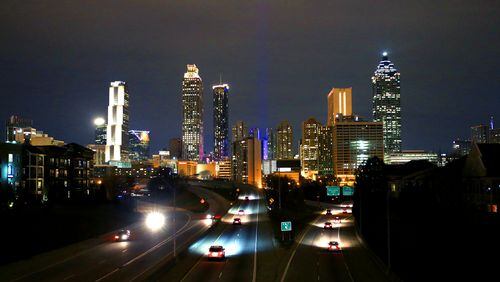Atlantans are driving more, consuming more fuel, experiencing more traffic delays – and not surprisingly they’re also more stressed out than in years past, a new report shows.
The number of miles traveled by motorists in the region has rebounded and even eclipsed pre-recession levels, according to the 2015 Urban Mobility Scorecard produced by Texas A&M Transportation Institute in partnership with INRIX.
The 10-year look back shows driving peaked in 2004 and 2005 with about 49 million freeway and 45 million arterial miles traveled. It dipped during the recession. But last year, motorists logged 51 million freeway and 46 million arterial miles.
All those extra miles made for more traffic congestion. We commuters sat in 148 million hours of traffic in 2014, compared to 139 million hours five years ago.
The amount of excess fuel consumed also rose to 57 million gallons in 2014, up from a recession-era low of 54 million gallons in 2010.
Atlanta's traffic outlook mirrors the rest of the country's. According to the report, the U.S. economy's rebound has meant a resurgence of traffic nationwide. Recent data from the U.S. Department of transportation shows Americans have driven a record 3 trillion miles in the last 12 months, surpassing the 2007 peak before the global financial crisis.
Washington D.C. sits at the top of the list of gridlock-plagued cities, with 82 hours of delay per commuter, followed by Los Angeles (80 hours), San Francisco (78 hours), New York (74 hours), and San Jose (67 hours).
Atlanta ranked 12th in an analysis of 471 urban areas in the U.S., with 52 hours wasted in traffic delays last year.
The "Commuter Stress Index" for Atlanta, ticked up to 1.32 from 1.31 for each of the four previous years. The index is based on the additional time that travelers have to take into account when planning a trip because of the unpredictability of traffic conditions.
The problem calls for a classic "all-hands-on-deck approach," said Tim Lomax, a report co-author and Regents Fellow at TTI.
"Our traffic problem is too massive for any one entity to handle -- state and local agencies can't do it alone," said Lomax in a press release. "Businesses can give their employees more flexibility in where, when and how they work, individual workers can adjust their commuting patterns, and we can have better thinking when it comes to long-term land use planning."
To download the full report, visit http://mobility.tamu.edu/ums/.






